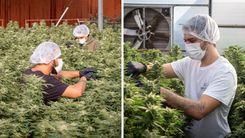The safe use of cannabinoids in pediatrics is the theme of episode 45 of Deusa Cast
Specialist in Endocannabinoid Medicine, pediatrician Lays Mello explains myths, risks, and benefits of using cannabinoids in children and adolescents, focusing on safety and scientific evidence.
Published on 09/24/2025

Doctor Lays Mello during Deusa Cast recording | Image: Sechat
The Deusa Cast has released its 45th episode with a topic of great relevance for families and healthcare professionals: the safe use of cannabinoids in pediatrics. The goal of the new episode is to demystify what many people call "medical marijuana". The guest was Dr. Lays Mello, a pediatrician who studies Endocannabinoid Medicine with a focus on autism, ADHD, and refractory epilepsy, and currently works at the Endocannabinoid Medicine outpatient clinic at the Jundiaí Medical School, providing services through the Brazilian Unified Health System (SUS).
During the interview, the doctor highlighted the main myths faced in family care. "Every time we talk about endocannabinoid medicine, the main doubts are: will they get high, will they get addicted, what will be the psychoactive effects," says Lays.
She explains that the prefrontal cortex, the brain region responsible for decision-making, cognitive thinking, and impulse control, is still developing until the age of 25, so the use of THC should be approached with caution. "THC has already been proven that, in moderate to heavy use, especially when inhaled, it impairs the development of the prefrontal cortex, which is still developing until the age of 25," clarifies the doctor.
When addressing how to use cannabis safely, Lays Mello explains that the initial strategy is always to prioritize formulations without THC. "Normally, we start treatment with formulations without THC and assess if it is necessary to introduce THC," she points out.
In cases where there is an indication, the use must be carefully calculated. "When the protocol determines the need for THC use, it is recommended to use a safe dose, with up to 0.3% THC. This is to avoid alterations in the central nervous system," she states.
She emphasizes, however, that there are specific situations where the risk-benefit ratio must be considered. "There are children who need a greater relaxation that THC provides. Not the psychoactive part, but the analgesic and relaxation effects," she says.
According to the doctor, this approach can provide significant benefits for patients with severe conditions. "The benefits help children to have a different view of the world. Many times they are always very lonely, with fixed thoughts, very involved only in their own routine. There are cases in the literature where there is self-awareness gain, very good for bedridden children, who have no understanding of the world or who they are due to severe neuropathies. In these cases, we see the need to introduce THC," she concludes.
The full episode is already available on streaming platforms and on the official Deusa Cast channel:








